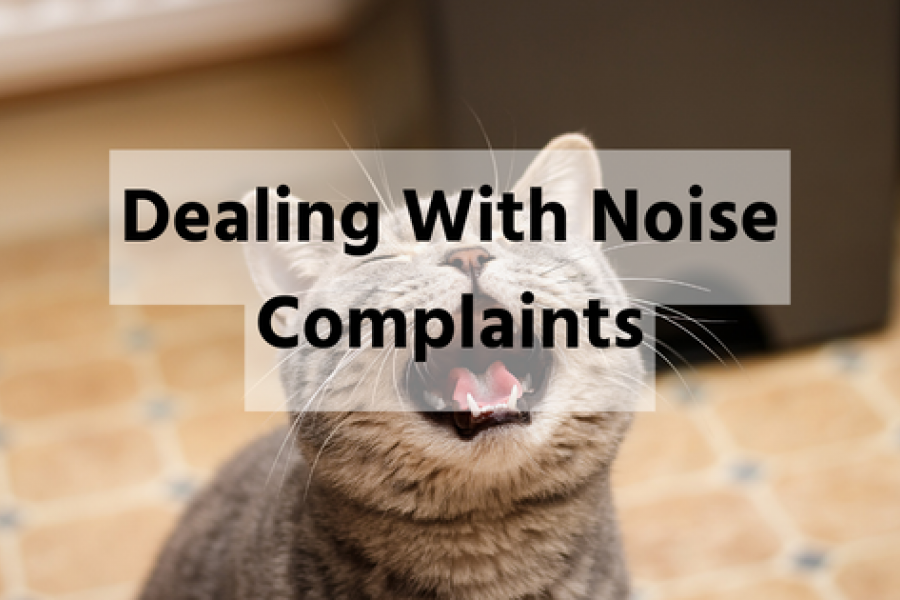
Landlords often find themselves facing plenty of challenges, and among the most common and delicate issues is handling noise complaints.
Unaddressed noise issues can not only disrupt the tranquility of your rental property, but also strain tenant relationships and potentially lead to legal complications.
In this blog post, we will look into various aspects of resolving noise complaints, ranging from understanding local noise ordinances to implementing proactive measures that foster a quiet and comfortable community.
Common Sources of Noise Complaints
Recognizing the difference between noise that disrupts the tenant's right to quiet enjoyment and noise that is a matter of personal preference ensures fair and effective resolution of complaints. This understanding forms the foundation for creating policies that address legitimate concerns without infringing on the reasonable activities of tenants.
Neighbor Interactions
One of the most common tenant complaints arises from interactions between neighbors. Everyday activities, such as conversations, parties, loud music, or even footsteps, can lead to disturbances. By establishing clear guidelines on acceptable noise levels in communal areas, educating on local noise ordinances, and encouraging considerate behavior, landlords can foster a harmonious living environment.
Appliances and Utilities
Household appliances and utilities can also be culprits in noise-related issues. From buzzing refrigerators to loud HVAC systems, these sources of noise dealing with this noise can impact the quality of life for tenants. Addressing the maintenance and placement of such appliances can significantly contribute to minimizing disruptions and enhancing overall satisfaction.

Building Structure and Design
The very structure and design of a building can play a role in noise-related challenges. Thin walls, poorly insulated floors, or shared ventilation systems can transmit sounds from one unit to another and be tough to deal with. Landlords can proactively mitigate potential noise issues and create a more comfortable living space for all residents by investing in soundproofing measures, keeping up on maintenance, and periodically assessing the building's infrastructure.
Steps to Take When Addressing Noise Complaints
Addressing noise complaints requires a systematic and empathetic approach. Here are the key steps to take
Gather Detailed Information
Communicate with the unsatisfied tenant to gather specific details about the noise. Ask about the nature of the noise, the time it occurs, and its frequency. Also, encourage the complainant to document instances of the noise, including dates and times.
On-Site Inspection
Conduct an on-site inspection to assess the noise firsthand. This may involve providing notice and visiting the complainant's residence during reported disturbance periods. Listen for the disturbance and try to identify its source. Pay attention to factors like building structure, insulation, and proximity to common areas.
Speak with Witnesses
If other residents may have witnessed or experienced the same noise, interview them to gather additional perspectives. Try to document any consensus among residents regarding the legitimacy of the complaint.

Check Lease Agreements and Policies
Review the lease agreements and noise-related policies in place. Ensure that both the complainant and the alleged source of the noise are aware of and in compliance with these lease terms. Moreover, determine if there are any lease violations based on the established guidelines, or otherwise breaches to the tenant's right to quiet enjoyment.
Use Technology
Consider using technology, such as sound level meters, to measure the intensity of the noise. This can provide objective data to support your investigation. Then, you can evaluate whether the noise levels exceed any limits set in your property's policies.
Mediation
If the investigation reveals conflicting perspectives from both parties, consider facilitating a mediation session between the complainant and the alleged noisy tenants.
Documentation
Keep a detailed record of your investigation, including notes from conversations, inspection findings, and any actions taken. This documentation can be valuable in case further steps, such as legal action, need to be taken.
Follow-Up
After taking any necessary actions to address the noise complaint, follow up with the complainant to ensure that the disturbance has been resolved to their satisfaction.
Monitor the situation to verify that the measures implemented are effective in preventing future complaints.
Why Landlords Should Consider Soundproofing for Happy Homes
Living in a place where you can hear every footstep or the neighbor's TV can get pretty frustrating. That's where soundproofing comes in handy, and landlords should seriously think about it to uphold their tenants' right to quiet enjoyment.

However, soundproofing doesn't mean tearing down walls or breaking the bank. There are simple and affordable solutions like adding weather stripping to doors, using rugs to dampen sound, or sealing up any gaps or cracks. These small changes can make a big difference.
What to Do If the Complaint Is Not Valid
Handling a situation where a noise complaint is determined to be invalid requires a delicate approach to maintain positive relationships among tenants. Here are some steps you can take.
Communicate Findings
Clearly and respectfully communicate your findings to the complainant. Share the results of the investigation, highlighting the specific reasons why the complaint is considered invalid. Provide any evidence or data collected during the investigation to support your conclusion.
Be Empathetic
Acknowledge the complainant's concerns and express empathy for the impact the noise was having on them. Try to reassure them that their well-being and comfort are important, even if the specific noise issue identified in the complaint is not considered valid.
Educate on Noise Policies
Remind the complainant of the noise policies outlined in the lease agreement or community guidelines. Reinforce the expectations for acceptable noise levels and explain how the policies are designed to create a balanced and harmonious living environment.

Offer Solutions
Propose solutions or alternatives to address any remaining concerns the complainant may have. This could involve suggesting ways to mitigate noise disruptions or exploring additional measures to enhance their comfort.
Establish Quiet Hours or Guidelines
If the noise complaint has sparked broader concerns, consider discussing the possibility of establishing specific quiet hours or guidelines for the community. This can help set expectations and prevent future misunderstandings.
Bottom Line
Dealing with noise complaints is an inevitable challenge for landlords, but with the right approach, it can lead to a more harmonious living environment for all tenants. Recognizing and understanding the common sources of noise complaints, from neighbor interactions to building structure, empowers landlords to implement targeted solutions that enhance the overall living experience.
For landlords seeking expert rental property management services, Campus Connection Property Management is here to help. Our commitment to creating positive living environments, addressing concerns promptly, and implementing effective solutions sets us apart.
